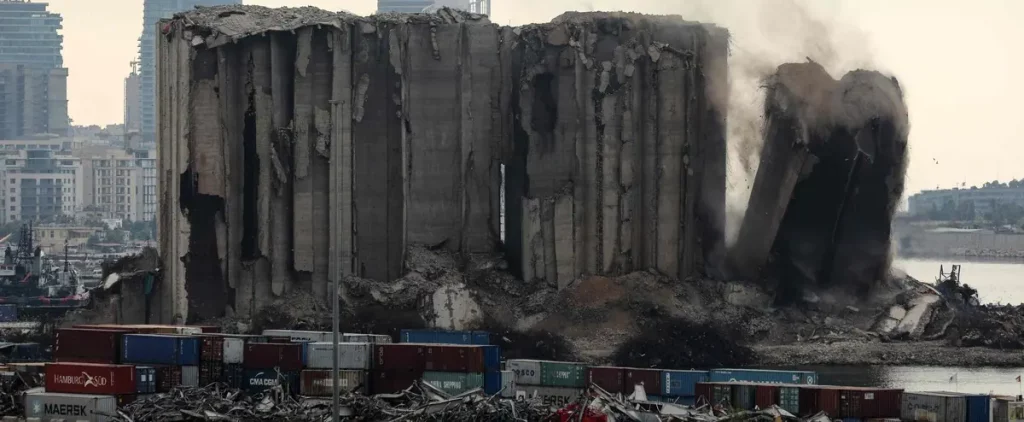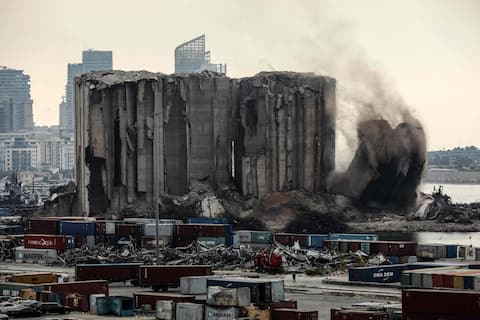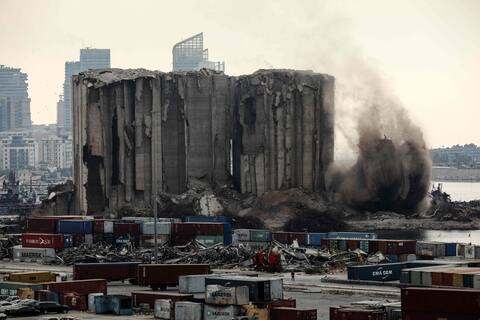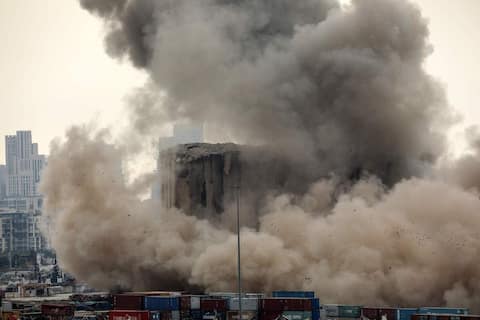
On Thursday, the second anniversary of the devastating explosion at the port of Beirut came as relatives of the victims demanded an international investigation into the tragedy and demonstrations as new silos collapsed in the port area.
• Also Read: Two years after the blast at Beirut port, Lebanon is on edge
• Also Read: BEIRUT: Two years after the explosion
On August 4, 2020, hundreds of tons of carelessly stored ammonium nitrate exploded in a warehouse near the port. More than 200 people were killed and 6,500 injured, and neighborhoods were completely destroyed, a tragic event that traumatized all Lebanese.
The exact cause of the blast, described as one of the world’s largest non-nuclear explosions ever recorded, is still unknown in a country where the identification of those responsible and impunity often prevail.
We need an “impartial, comprehensive and transparent investigation into the explosion,” UN Secretary-General Antonio Guterres said Thursday, echoing calls from NGOs, experts and victims’ families.
Sharp at 6:07 pm (3:07 pm GMT) on Thursday, the time of the explosion two years ago, demonstrators observed a minute’s silence and clapped in front of the port, where a few minutes earlier, a new section of silos containing thousands of tons of wheat and other cereals collapsed after a fire.
The collapse occurred as three separate marches approached the port of Beirut. Huge clouds of smoke covered the port area after the collapse and protesters at the site wore masks as they filmed the structure with their mobile phones.
“Two years later I see the same scene from almost the same place,” Lama Hachem, 30, told AFP in downtown Beirut as he watched smoke and dust billow from the port.
“We have the right to know the truth”, began Mireille Khoury, who lost her son in the blast, before thousands of demonstrators waving Lebanese flags.
The participants swore an oath to confirm their intention to continue the fight until the identity of the “criminal” was revealed.
An international survey
“There is no justice under the rule of the militia and the mafia”, can we read on one of the banners printed by the demonstrators. A reference to the ruling elite – in place for decades – accused large sections of the population of abuse, corruption and negligence.
“When the explosion happened, we thought the truth would be known after five days … Two years have passed and we don’t know anything,” 21-year-old Aya Qassem, who took part in the demonstrations, told AFP.
One of the marches stopped briefly in front of the French embassy, to call for support in resuming the trial.
“We are calling for an international investigation into the perpetrators,” said Tracey Nagger, who lost her 3-year-old daughter Alexandra in the blast.
In an interview with the Lebanese daily L’Orient-Le Jour published on Thursday, French President Emmanuel Macron emphasized the importance of knowing the truth.
“I say it again today forcefully: Justice must be served. For mourning and reconstruction, Lebanese men and women and all who live in this country (…) must know the truth,” he said.
Lebanon today is caught in the worst financial crisis in its history, the unsustainable collapse of the local currency, all kinds of shortages, banking restrictions that have caused the impoverishment of the population.
“only hope”
In April, the government ordered the demolition of the silos, but the operation was temporarily halted after relatives of victims who wanted to memorialize it objected. But two weeks ago, a fire broke out in the most damaged part of the silos, causing the silos to collapse on Sunday and again on Thursday.
In a press release on Thursday, the victims’ families association condemned the authorities’ “passivity” in the fire. “Even though the part (of the silos) has collapsed, we (…) insist on the preservation and protection of the rest of the structure.
The trial was also stalled for months by political obstacles. The lead investigator, Tarek Bitar, was prevented from continuing his mission by a series of lawsuits brought against him and by a campaign led by Hezbollah’s powerful armed movement accusing the judge of bias.
“Lebanese justice must be able to complete and complete its investigation in full transparency without any political interference,” a spokesman for the Quai d’Orsay said at a press conference on Thursday.
However, for NGOs and independent experts from the UN “it is clearer today than ever that the national inquiry did not do justice”. And an international investigation is needed “without delay.”








More Stories
Allegations of corruption Qatar warns of ‘negative impact’ of European measures
USA: Famous “Hollywood cat” euthanized in Los Angeles
The campaigner who called for the shooting of Ukrainian children has not been charged